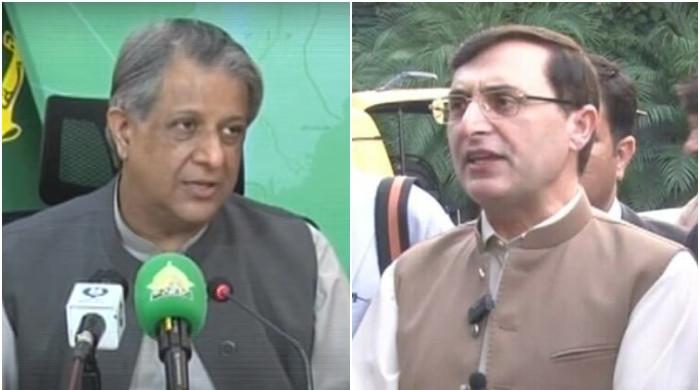ISLAMABAD: Hours after the Supreme Court issued a detailed verdict of the reserved seats case wherein the Pakistan Tehreek-e-Insaf was declared eligible for seats’ in assemblies, Law Minister Azam Nazeer Tarar reiterated that decision of joining any political party by independents is “irreversible”, saying that the Imran Khan-founded party was not even a petitioner in the case.
“Legal question still remains in place […] the detailed judgement didn’t interpret how the reserved seats will be allocated to the party as per the current regulations,” the minister said while addressing a press conference on Monday.
He was referring to the Elections (Second Amendment) Act, 2024 that was enacted to circumvent the SC ruling on the reserved seats as it barred independent candidates from joining any political party after the specific time.
The law minister said Articles 51 and 106 of the Constitution warrant that independents will have to join a political party within three days of the publication in the official Gazette of the names of the returned candidates.
Tarar said parliament has amended the Sections 66 and 104 (a) of the Election Act, which is now the existing law in the country.
Referring to the PTI-backed returned candidates, the minister said the independents, who have already joined the Sunni Ittehad Council, cannot join any other party, adding that parliament is fully empowered to make or amend laws.
In its 70-page judgement issued today, the apex court termed the PTI “a political party” and eligible for the seats’ quota. It stressed that the lack of an electoral symbol does not affect its constitutional right to take part in elections.
The PTI is a political party and won seats in the national and provincial legislatures in the general elections, the court remarked, while directing the country’s top electoral body to notify the former ruling party’s members on the reserved seats.
“The ECP’s March 1 decision is contradictory to the Constitution and has no legal value,” the apex court said while referring to the body’s decision wherein it had declined the Sunni Ittehad Council’s (SIC) plea for allocation of reserved seats and had instead decided to give them to other political parties on the principle of proportional representation.
Additionally, the court also declared the returning officers’ (ROs) act of mentioning PTI candidates as independent candidates in Form-33 “unconstitutional and unlawful”.
Meanwhile, Tarar remarked the interpretation of Constitution should not be done in such a way that the “structure itself changes”.
Raising questions over the judgment, the law minister said PTI, which benefitted from the detailed judgement, as a ‘political party’ didn’t seek the reserved seats. “It [PTI] neither move Election Commission, nor Peshawar High Court,” he added.
Giving details of the case, the minister said that the Election Commission’s move — denying the PTI-backed independent lawmakers reserved seats in the assemblies — was upheld by Peshawar High Court (PHC).
“It was never the case of MNAs [members of National Assembly] that they belong to PTI,” Tarar clarified, pointing out that they submitted their affidavits of allegiance to SIC.
“The case had only two points — whether SIC can get reserved seats or not?” However, he maintained, the matter will be settled as per the Constitution of Pakistan.
PTI asks ECP to notify 38 MNAs
On the other hand, PTI Chairman Barrister Gohar Ali Khan has demanded the electoral watchdog to declare the 38 PTI-backed MNAs as member of the opposition party in line with the apex court’s reserved seats verdict.
Urging the ECP to decide the matter of reserved seats allocation, Barrister Gohar said the reserved seats were the PTI’s right.
He said the ECP has “compromised” on its independent status. adding that the top court’s verdict also ruled that electoral body cannot deny the reserved seats to the PTI.
Barrister Gohar further said that the 40 of the 41 PTI lawmakers had already submitted their affidavits to the ECP but the electoral body remained undecided on the matter despite holding marathon meetings.


